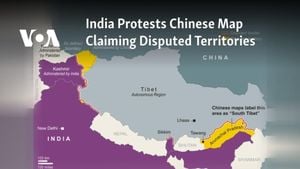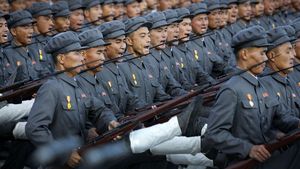Myanmar's military leader, Senior General Min Aung Hlaing, is gearing up for his first trip to China since seizing power during the 2021 coup. This highly anticipated visit is set for this week and highlights the fragile but pivotal relationship between Myanmar’s military junta and its most significant ally, China.
This trip marks the first time Min Aung Hlaing has crossed the border since overthrowing the democratically elected government led by Aung San Suu Kyi. His visit aims to address various regional issues, signaling the continuing cooperation between Beijing and Naypyidaw amid growing internal strife within Myanmar.
The upcoming summit will take place in Kunming, where Hlaing is expected to engage with officials from several countries. The event brings together leaders from the Greater Mekong Subregion (GMS), which comprises China, Myanmar, Thailand, Laos, Vietnam, and Cambodia. This gathering will focus on enhancing regional economic strategies and cooperation efforts, underscoring China's role as not just an ally but also as a key player in regional trade and politics.
China has been Myanmar's steadfast supporter and is the largest provider of arms to the junta government. Analysts point out, though, there is more to this relationship: Beijing maintains connections with various ethnic armed groups within Myanmar, particularly those controlling territories along the border. Such dynamics complicate the situation as it affects trade routes and stability, particularly the significant highway linking China and Myanmar, which has encountered disruptions due to clashes between armed groups.
"Min Aung Hlaing will meet with Chinese government officials to discuss strengthening the friendship and cooperation between both countries," stated the Myanmar junta, emphasizing the intention to tackle economic and multi-sectoral partnerships. The military's continued turbulence, marked by resistance from ethnic minorities and civilian-led groups, intensifies the need for Hlaing to secure support from China.
According to Chinese foreign ministry spokesperson Mao Ning, there is a pressing need to "strengthen unity and cooperation," particularly against the backdrop of global economic uncertainties. She expressed anticipation for fostering discussions on enhancing trade and interconnectivity during this summit, indicative of China's vested interest in maintaining stability within Myanmar.
While Myanmar's military struggles against significant armed resistance, primarily from various ethnic minorities and the rising 'People's Defence Forces' aiming to contest military control, China's support remains resolute. Notably, Beijing has reiterated support for the junta's intentions to carry out elections, which many critics assert will lack legitimacy and transparency.
The junta's relations with China haven't been without their challenges. Recent tensions have arisen over Myanmar's reluctance to curb online scams, particularly compounds targeting Chinese citizens and employing trafficking victims. Analysts suggest China's irritation over these operations may have even catalyzed support for ethnic rebel offensives against the junta, calling for action to dismantle such schemes.
Min Aung Hlaing has often sought support beyond China, visiting Russia multiple times and solidifying ties with President Vladimir Putin. His regional strategies are now framed amid rising geopolitical tensions and the need for diverse alliances to bolster the junta's standing, both domestically and internationally.
Looking forward, this visit may not only reassess the military's abilities to navigate its tumultuous political environment but also illuminate the broader dynamics at play within Southeast Asia. With nations grappling with their own challenges, the outcomes of this summit could shape future engagements between Myanmar and its allies.
China's careful orchestration of this relationship indicates its role as a gatekeeper of stability within the region, blending economic interests with the complex social and political fabric of Myanmar. The backdrop of growing resistance coupled with international scrutiny puts additional pressure on Min Aung Hlaing’s military government, even as it seeks to modernize and strengthen its alliances.
During his summit participation, the General is expected to discuss pressing international issues with leaders from across Southeast Asia, touching on matters ranging from trade challenges to regional security. The intensity of the dialogue and subsequent agreements reached will likely indicate just how far Myanmar can maneuver within the shifting allegiances of its neighborhood.
This visit certainly isn't just about regional talks; it embodies the military's search for legitimacy and survival amid fierce domestic opposition. With sharp international criticism following the military coup, Hlaing's engagement with China is possibly seen as both lifeline and legitimization, as Myanmar faces its internal crises.
All eyes will now be on the outcomes of Min Aung Hlaing's trip, which could provide insight not only on Myanmar’s political developments but also on the extent of China's commitment to maintaining influence over its neighboring ally during unsettled times.



